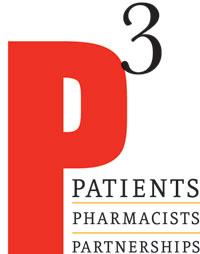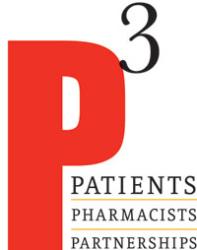SOP’s Maryland P3 Program Now Available in Pilot to Select State Employees
Pilot project for 5,000 state workers uses School’s expertise to develop, implement, and evaluate the effectiveness of comprehensive medication therapy management services.

By Steve Berberich
May 10, 2013
During the next 14 months, the Maryland P3 (Patients, Pharmacists, Partnerships) Program will offer eligible employees at the State Center Office Complex in downtown Baltimore the opportunity to join a pilot project providing medication therapy management (MTM) services by specialty-trained pharmacists . Employees will privately meet with pharmacists at their workplace, located at 201 West Preston Street.
“We are extremely pleased to enter into this partnership to provide employees from the state of Maryland with services through this evidence-based program that has been proven to improve health and reduce costs,” says Magaly Rodriguez de Bittner, PharmD, BCPS, CDE, professor and chair of the Department of Pharmacy Practice and Science at the School of Pharmacy and director of the Maryland P³ Program. “We look forward to demonstrating the program’s positive results and determining the potential valued-based benefit to the state.”
Established in August 2006, the Maryland P3 Program is a partnership of the School of Pharmacy, the Department of Health and Mental Hygiene’s (DHMH) Center for Chronic Disease Prevention and Control, and the Maryland Pharmacists Association. The program utilizes pharmacists as medication experts working in collaboration with employees’ primary care providers to assist with proper use of medications, diagnostic testing, counseling, and overall disease state management. Since its inception, the program has enrolled more than 700 patients at seven different companies.
MTM services have been shown to improve health outcomes and reduce direct health care costs by reducing the number of hospital and emergency room visits for participants working for self-insured employers, with savings ranging from $495 to $3,281.
Through the new pilot project with the state, eligible employees will meet with a specially-trained pharmacist for a one-time MTM review to carefully assess their current medications and over-the-counter supplements for safety, appropriateness, and effectiveness. The pharmacist will also review employees’ medical and medication histories and assess their knowledge of and adherence to current medication therapy, diet, smoking status, and exercise regimen. Pharmacists will also identify potential and actual drug-related problems, such as side-effects and dangerous medication interactions.
“Individuals who manage multiple health conditions or receive prescription medications from
multiple health care providers are especially at risk for dangerous interactions and side effects,” said Joshua M. Sharfstein, MD, DHMH Secretary. “Services offered through the Maryland P³ Program are proven to maximize the effectiveness of medications, while improving communication between patients and their providers.”
Following the MTM review, each employee and his or her primary care provider will receive a medication list and an individualized medication action plan. Employees who have or are determined to be at risk for developing cardiovascular disease — such as those with hyperlipidemia, hypertension, obesity, diabetes, metabolic syndrome, and tobacco dependency — will also be eligible to participate in a more in-depth, comprehensive program that will allow them to meet with a pharmacist four to seven times a year.
Pharmacists will work collaboratively with employees and their health care providers to set short-term and long-term self-management goals. Notes from pharmacists’ sessions with employees will be documented in ThinkEHRx, a pharmacist-focused case management system provided by eHealthObjects, Inc. ThinkEHRx will house the program’s clinical, behavioral, and medication adherence data, including recommendations related to the standard of care and health care provider referrals. Written notes will also be sent to the employee’s health care provider following each session to ensure collaboration and continuity of care.



